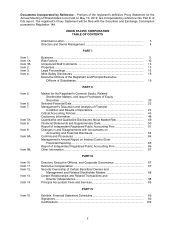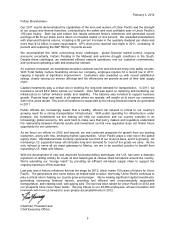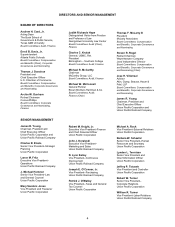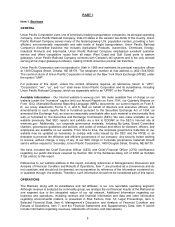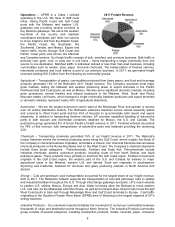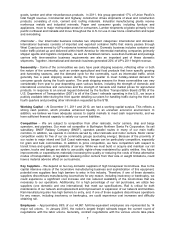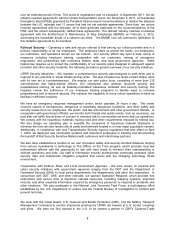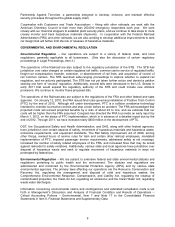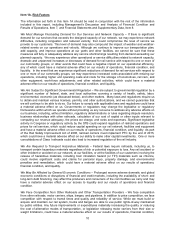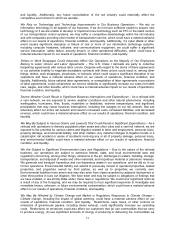Union Pacific 2011 Annual Report Download - page 11
Download and view the complete annual report
Please find page 11 of the 2011 Union Pacific annual report below. You can navigate through the pages in the report by either clicking on the pages listed below, or by using the keyword search tool below to find specific information within the annual report.11
and liquidity. Additionally, any future consolidation of the rail industry could materially affect the
competitive environment in which we operate.
We Rely on Technology and Technology Improvements in Our Business Operations – We rely on
information technology in all aspects of our business. If we do not have sufficient capital to acquire new
technology or if we are unable to develop or implement new technology such as PTC or the latest version
of our transportation control systems, we may suffer a competitive disadvantage within the rail industry
and with companies providing other modes of transportation service, which could have a material adverse
effect on our results of operations, financial condition, and liquidity. Additionally, if a cyber attack or other
event causes significant disruption or failure of one or more of our information technology systems,
including computer hardware, software, and communications equipment, we could suffer a significant
service interruption, safety failure, security breach, or other operational difficulties, which could have a
material adverse impact on our results of operations, financial condition, and liquidity.
Strikes or Work Stoppages Could Adversely Affect Our Operations as the Majority of Our Employees
Belong to Labor Unions and Labor Agreements – The U.S. Class I railroads are party to collective
bargaining agreements with various labor unions. Disputes with regard to the terms of these agreements
or our potential inability to negotiate acceptable contracts with these unions could result in, among other
things, strikes, work stoppages, slowdowns, or lockouts, which could cause a significant disruption of our
operations and have a material adverse effect on our results of operations, financial condition, and
liquidity. Additionally, future national labor agreements, or renegotiation of labor agreements or provisions
of labor agreements, could compromise our service reliability or significantly increase our costs for health
care, wages, and other benefits, which could have a material adverse impact on our results of operations,
financial condition, and liquidity.
Severe Weather Could Result in Significant Business Interruptions and Expenditures – As a railroad with
a vast network, we are exposed to severe weather conditions and other natural phenomena, including
earthquakes, hurricanes, fires, floods, mudslides or landslides, extreme temperatures, and significant
precipitation that may cause business interruptions, including line outages on our rail network, that can
adversely affect our entire rail network and result in increased costs, increased liabilities, and decreased
revenue, which could have a material adverse effect on our results of operations, financial condition, and
liquidity.
We May Be Subject to Various Claims and Lawsuits That Could Result in Significant Expenditures – As a
railroad with operations in densely populated urban areas and other cities and a vast rail network, we are
exposed to the potential for various claims and litigation related to labor and employment, personal injury,
property damage, environmental liability, and other matters. Any material changes to litigation trends or a
catastrophic rail accident or series of accidents involving any or all of property damage, personal injury,
and environmental liability could have a material adverse effect on our results of operations, financial
condition, and liquidity.
We Are Subject to Significant Environmental Laws and Regulations – Due to the nature of the railroad
business, our operations are subject to extensive federal, state, and local environmental laws and
regulations concerning, among other things, emissions to the air; discharges to waters; handling, storage,
transportation, and disposal of waste and other materials; and hazardous material or petroleum releases.
We generate and transport hazardous and non-hazardous waste in our operations, and we did so in our
former operations. Environmental liability can extend to previously owned or operated properties, leased
properties, and properties owned by third parties, as well as to properties we currently own.
Environmental liabilities have arisen and may also arise from claims asserted by adjacent landowners or
other third parties in toxic tort litigation. We have been and may be subject to allegations or findings that
we have violated, or are strictly liable under, these laws or regulations. We could incur significant costs as
a result of any of the foregoing, and we may be required to incur significant expenses to investigate and
remediate known, unknown, or future environmental contamination, which could have a material adverse
effect on our results of operations, financial condition, and liquidity.
We May Be Affected by Climate Change and Market or Regulatory Responses to Climate Change –
Climate change, including the impact of global warming, could have a material adverse effect on our
results of operations, financial condition, and liquidity. Restrictions, caps, taxes, or other controls on
emissions of greenhouse gasses, including diesel exhaust, could significantly increase our operating
costs. Restrictions on emissions could also affect our customers that (a) use commodities that we carry
to produce energy, (b) use significant amounts of energy in producing or delivering the commodities we


